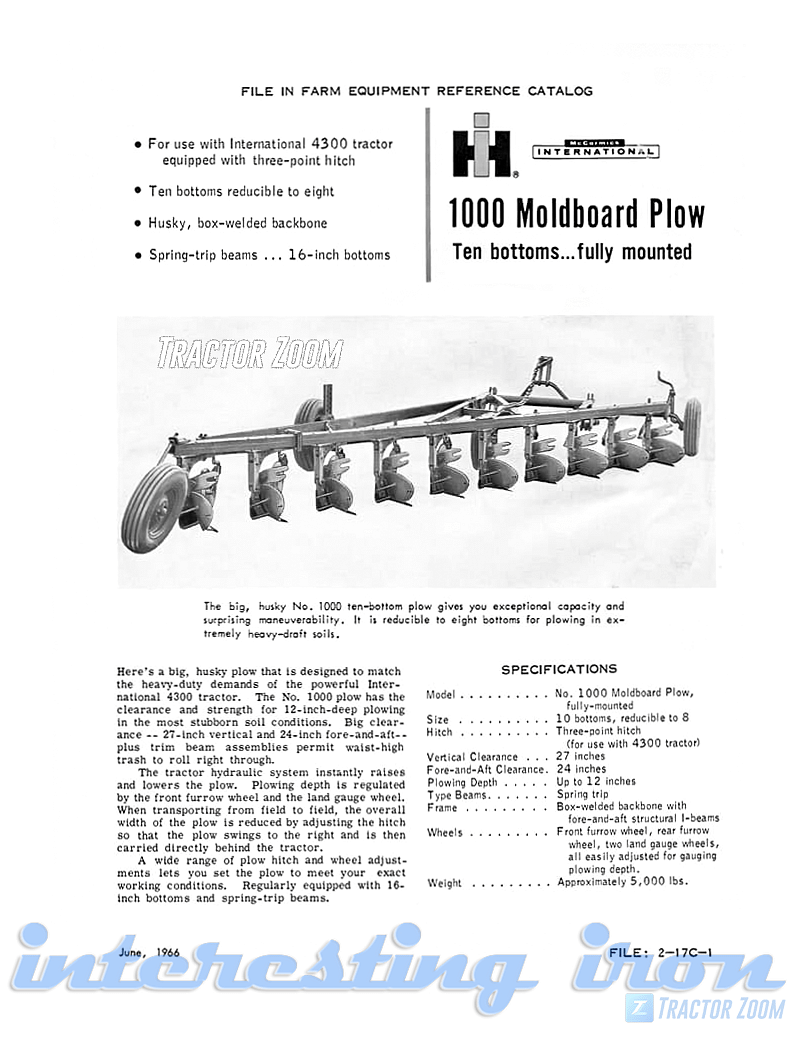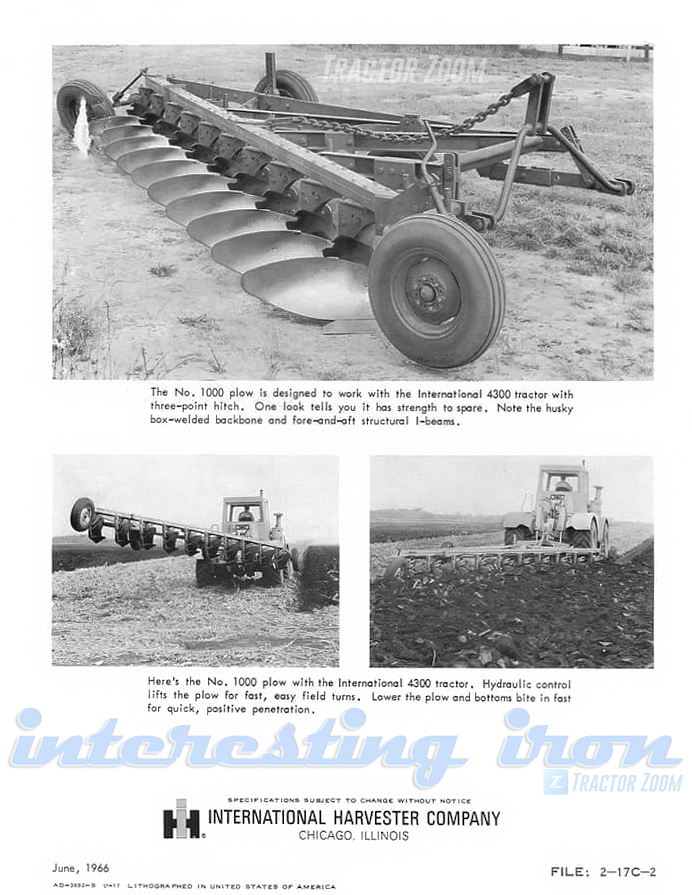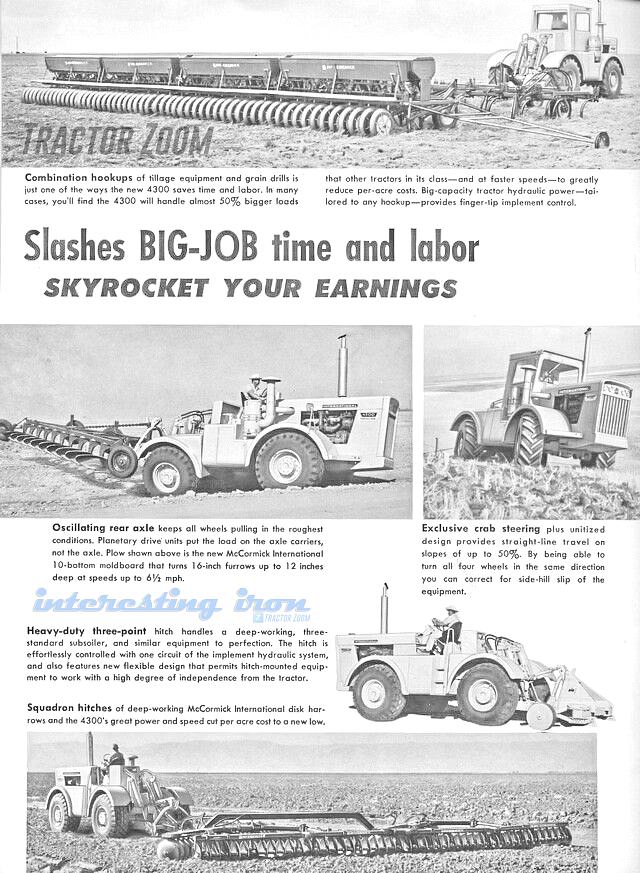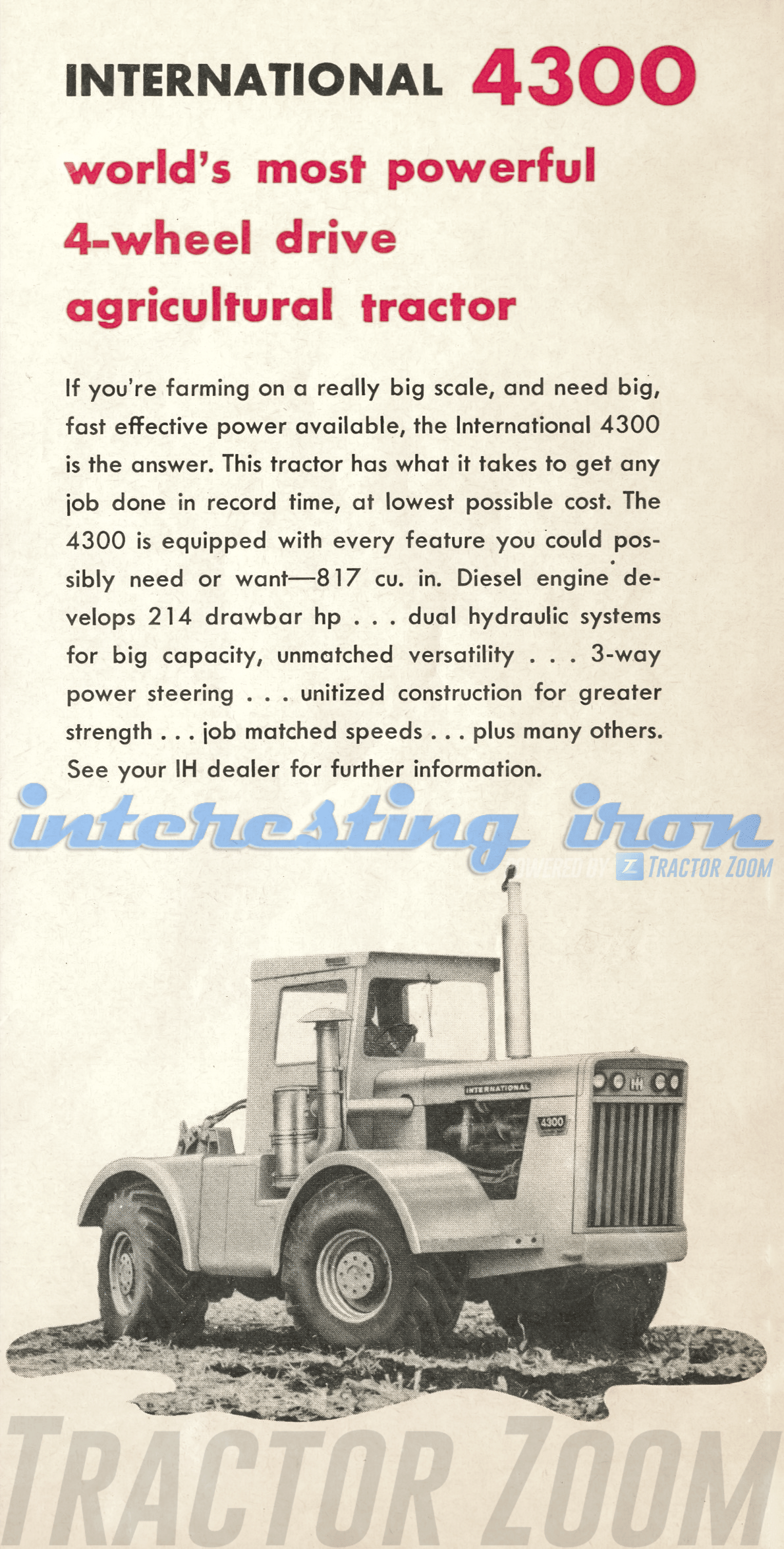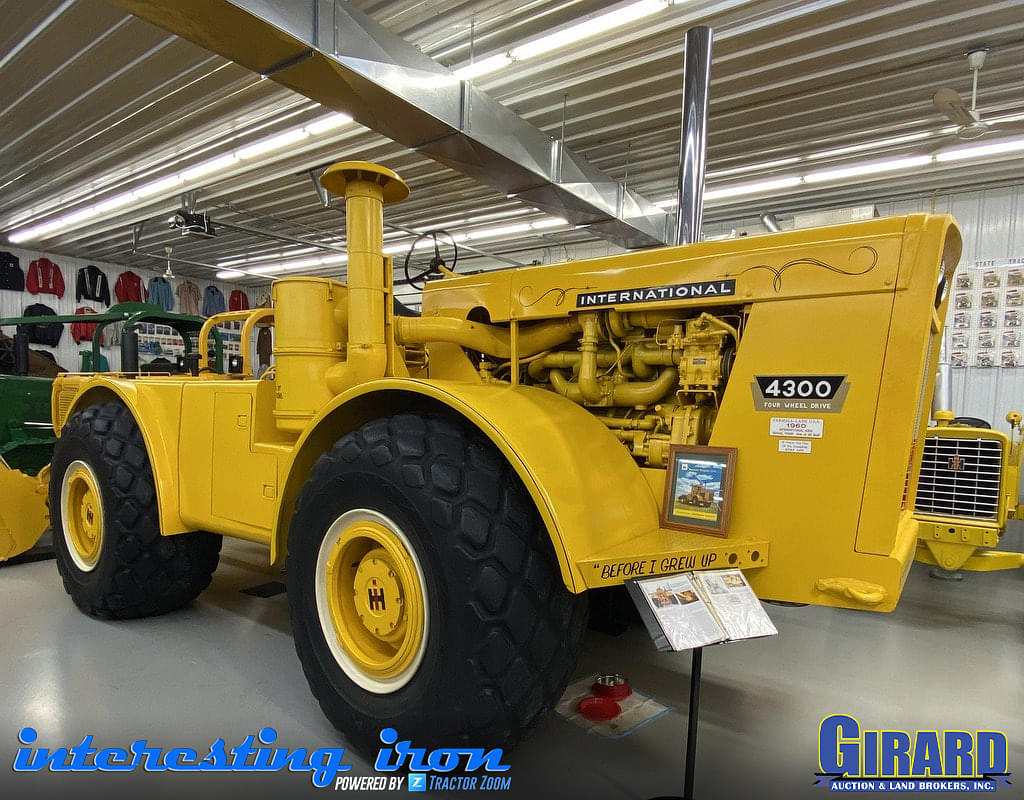
See the auction listing for this tractor
Today, we take a look at the crown jewel of the Farmall Land collection, the IH 4300. This one has a pretty good story behind it, both in terms of history as well as how it came into Jerry’s hands.
By continuing, Tractor Zoom uses cookies to analyze usage to help us improve your experience. View Privacy Policy
4WD, HOUGH, INTERESTING IRON, INTERNATIONAL HARVESTER, MUSEUMS, RESTORATIONS, TRACTORS
Ryan Roossinck
December 03, 2020

Today, we take a look at the crown jewel of the Farmall Land collection, the IH 4300. This one has a pretty good story behind it, both in terms of history as well as how it came into Jerry’s hands.
In the early 30s, a guy named Frank Hough bought a company that made digging attachments for tractors, and set out to add a new term to the dictionary. His company built heavy-duty wheel loaders, and called them PayLoaders. The term stuck, and the construction industry still calls pretty much any wheel loader a payloader today. In the late 50s, Hough sold the company to Harvester, and built quite a few different types of IH construction equipment…and one great big farm tractor.

In the late 50s, engineers from Hough got the green light from Harvester to develop a BIG farm tractor. Nobody really knows how or why they got put on the project. Harvester didn’t typically ask for input on farm equipment from other business units. The working theory was that Brooks McCormick was worried about a Portland-based manufacturer, Wagner Tractor Company. Wagner had an articulating 4WD tractor, the TR-14, that was starting to grab marketshare in the Pacific Northwest, and there was fear that they’d start taking farmers away from IH in the northern plains as well.
Up until now, farmers out in the Great Plains and the Pacific Northwest typically used crawlers to handle field work. Crawlers were slow, dusty, and because they were on tracks – hard to transport. The idea of a high-horsepower tractor on rubber was very appealing; it would do the same work faster and more efficiently (and because the operator sat higher, they’d end up eating less dust).
Hough had a prototype ready in 1959, and while Harvester liked the idea, they felt like it didn’t make enough power to compete effectively. The prototype made about 160 horse, and it was rumored that Deere’s 8010 prototype made closer to 200 horse. A year or so later, Hough had re-engineered the prototype to fit the need. It made more power – a lot more, in fact. They used an 817-inch turbodiesel that made 300 horse at the crank! Additionally, it was 4WD, featured front-wheel, four-wheel, and even crab-steer for hillside operation.
In reality, photos really don’t do justice to the enormity of what Hough actually built. The 4300 is over 21′ long, darn near 10′ wide, and tips the scales at 30,000 pounds! (While that’s not super big by today’s standards, it was absolutely gigantic in the early 60s!)
Unfortunately for Harvester…it was TOO big and a little too far ahead of its time. Farmers weren’t ready for the expense of a big tractor like that, and quite frankly, there weren’t implements available that could take advantage of the 4300’s capabilities. Hough built these tractors to order at their plant in Libertyville, IL, and they didn’t build very many of ’em. There are conflicting numbers as far as final production goes, but it’s somewhere between 36-40.
The 4300 that Jerry owns has a bit of a story to it, and traveled quite a long ways to get to him, too! It was one of two that IH sold new in 1961 in the northern Central Valley of California. In the mid/late 80s, the Leaman Brothers bought the tractor at an auction in LeGrange, CA and took it home to their shop in Pennsylvania. Ironically, the semi that took it across the country passed within a quarter mile of Jerry’s dealership in Avoca on that trip!
At any rate, Jerry bought it from Ed Leaman later that summer. When it got to Avoca, he started the long process of restoring it. Apparently, it was used in mud quite a bit, and it took him several days just to clean it up enough to see what he had! The tractor wasn’t a basket case per se, but it definitely wasn’t perfect either; it leaked oil from the valves, and there were plenty of other little odds and ends that needed addressed. The restoration process took a year or so.
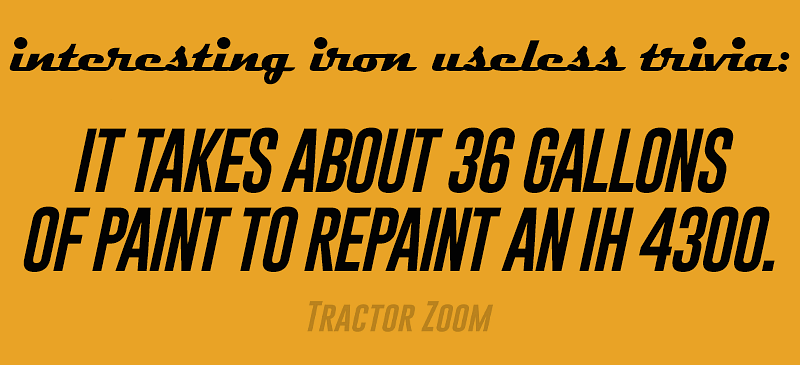
Since completing the restoration, the overgrown Cub Cadet is on more or less permanently on display at Farmall Land, but I know Jerry takes it out for fresh air once in a while. It’s always a big hit at parades or tractor shows, that’s for sure. There’s plenty of videos on YouTube and photos on the internet of this tractor at shows – with the pinstriping and the quote painted on the front fenders, this one is hard to miss!
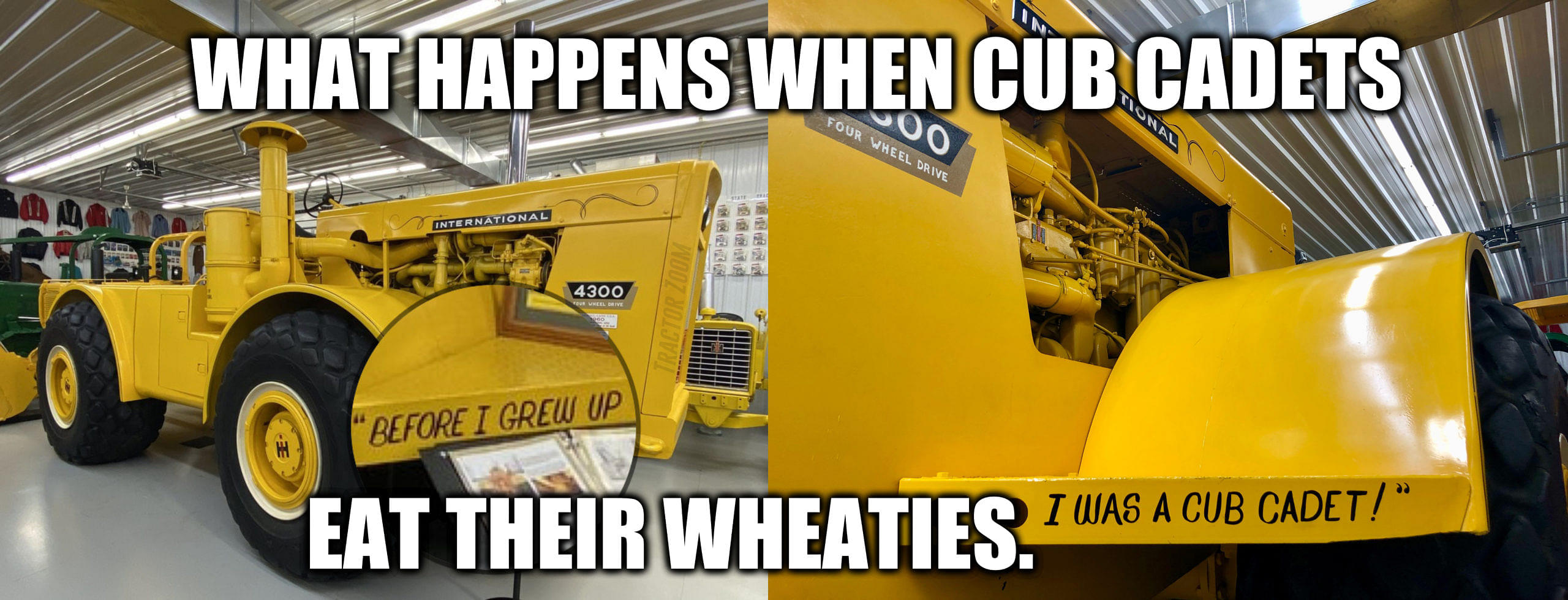 Sometimes the memes just write themselves, y’know?
Sometimes the memes just write themselves, y’know?
Honestly, I have no idea. Of the 40(ish) IH 4300s produced, collectors have snatched up the majority of them. However, some are still working on farms in the Great Plains and in Western Canada, too. I only know of one other one restored to this level, though, and it won’t sell any time soon. A couple 4300s have sold since March of 2019 – one with a cab (it sold for almost $94,000), and the other without (it sold in late March for about $67,000). For the latter, the pandemic was hitting and the stock market was in free-fall mode. I do think the pandemic was a contributing factor to how the hammer fell.
Although we’re still dealing with the pandemic, I do think this one will bring pretty good money; it’s definitely the most famous 4300 out there, and it’s in great shape. Personally, I hope it gets to six figures (and I don’t think that’s completely out of reach). If the new owner enjoys that big ol’ Cub Cadet half as much as Jerry has, it’ll be well-worth the money!
Up above, I’d mentioned the “other” IH 4300 that was as nicely-restored as Jerry’s. Here’s a video from Prairie Farm Report about that tractor. Cool story!
There are still a few 4300s that see some farm work here and there. Here’s an older video of one of these big fellas running an 8-bottom moldboard plow in fall tillage. Listen to that big honkin’ motor! Although there’s a little wind noise, it sounds AWESOME!
One of the reasons that the IH 4300 didn’t turn the farming world on its ear was because there weren’t implements that were large enough to really take advantage of the capability. There were a few, but big-acre implements were still a few years away. Harvester did design a pretty cool 10-bottom moldboard plow for it, though. There were very few of them ever built, and as far as I know, there’s only one that’s survived. Here’s some of the advertising literature on it.
